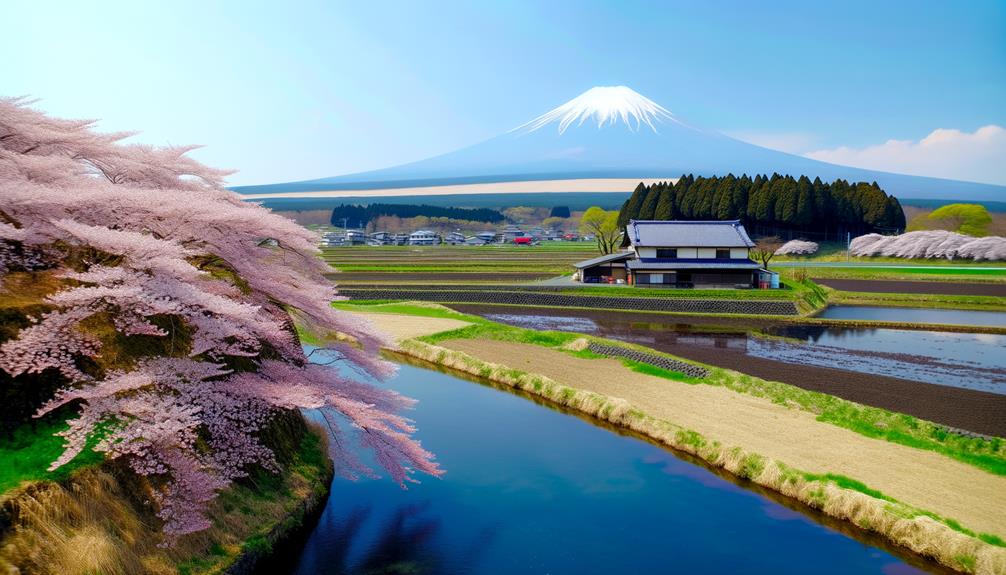Meaning of the Name Tanaka
The name Tanaka is a common Japanese surname originating from 'ta' meaning 'rice field' and 'naka' meaning 'middle' or 'center.' This etymology reflects the agrarian roots of Japan and signifies a central place within a community. Historically, the name has been prevalent since the Heian period, appearing among various social classes including aristocrats and samurai.
Today, it remains widespread and symbolizes traditional values, simplicity, and humility. The name also highlights a balanced relationship with nature and ancestral lands.
For insights into cultural nuances, regional variations, and notable individuals who bear this name, there is much more to explore.

Key Takeaways
- The name Tanaka means 'middle of the rice field.'
- Originates from Japan, reflecting the country's agrarian roots.
- Symbolizes being central or important within a community.
- Represents traditional Japanese values of simplicity and humility.
- Connects individuals to ancestral lands and farming heritage.
Etymology of Tanaka
The name 'Tanaka' originates from Japan, deriving from the combination of the words 'ta' (田), meaning 'rice field,' and 'naka' (中), meaning 'middle' or 'center.'
This etymology reflects Japan's agrarian roots, where rice cultivation was central to both the economy and daily life.
The positioning of a rice field in the 'middle' or 'center' could imply a place of importance or centrality within a community.
The name encapsulates a sense of geographical and social significance, indicating that individuals bearing this surname might have been closely tied to agricultural practices.
This etymological insight provides a foundational understanding of how surnames in Japan often connect individuals to their ancestral lands and occupations, enhancing the cultural tapestry of the region.
Historical Context
Historical records indicate that the surname Tanaka has been prevalent since the Heian period, reflecting its deep roots within Japanese society.
The Heian period (794 to 1185 AD) was characterized by the establishment of a sophisticated court culture and the development of Japanese literature and arts. During this era, surnames became more systematically used among the aristocracy and later diffused to the samurai class and commoners.
The name Tanaka, translating to 'center of the rice field,' suggests agrarian origins, hinting at the socio-economic backdrop of its bearers. The widespread adoption of this surname signifies its enduring legacy and the integral role agriculture played in shaping historical Japanese communities.
Such historical context underscores the name's longstanding presence and societal relevance.
Cultural Significance
The cultural significance of the name Tanaka extends beyond its historical roots, influencing social dynamics and carrying symbolic interpretations.
By examining its usage within various societal contexts, one can appreciate how the name embodies certain values and traditions.
This analysis will illuminate the multifaceted role Tanaka plays in both historical and contemporary settings.
Historical Context
Rooted in Japanese culture, the name Tanaka carries significant historical weight, symbolizing a lineage of agrarian heritage and societal roles. Etymologically, 'Tanaka' translates to 'dweller in the middle of the rice field,' reflecting the agrarian society prevalent during feudal Japan. This nomenclature indicates that families bearing the name were likely engaged in rice cultivation—a cornerstone of the Japanese economy and culture.
Historically, the Tanaka name is emblematic of the rural communities that formed Japan's socio-economic backbone. The significance of this name lies not only in its literal meaning but also in its encapsulation of the crucial role that agriculture played in shaping Japanese society, underscoring the interconnectedness of family identity and agricultural livelihood.
Social Influence
Reflecting its deep cultural roots, the name Tanaka has exerted considerable social influence, symbolizing a connection to Japan's agrarian past and the values of community and perseverance. This influence is evident in various aspects of Japanese society:
- Rural Identity: The name Tanaka often connotes a lineage tied to farming communities.
- Cultural Heritage: It emphasizes the importance of traditional agricultural practices.
- Social Cohesion: Individuals with the name Tanaka are perceived as embodying collective harmony.
- Work Ethic: The name is associated with diligence and resilience.
- Historical Pride: Tanaka underscores a sense of pride in Japan's agrarian history.
This social influence has perpetuated a cultural reverence that underscores the significance of agriculture in shaping Japanese social structures.
Symbolic Interpretation
Beyond its social influence, the name Tanaka holds rich symbolic interpretations that resonate deeply within Japanese cultural narratives.
Derived from the kanji characters 田 (ta), meaning 'rice field,' and 中 (naka), meaning 'center' or 'middle,' the name signifies more than its literal components. Rice fields are emblematic of sustenance, prosperity, and community, anchoring the name in agricultural heritage.
The concept of 'center' implies balance and pivotal importance, reflecting a central role in societal structure. This duality underscores the intrinsic value placed on harmony and interdependence within Japanese culture.
Therefore, Tanaka is not merely a surname; it encapsulates essential cultural principles, illustrating how names serve as vessels of historical and philosophical significance in Japan.
Regional Variations
Regional variations in the name Tanaka are particularly evident in its cultural significance across different areas of Japan. As well as in pronunciation and spelling differences. While the core meaning remains consistent, local dialects and linguistic nuances can affect how the name is spoken and written.
Understanding these variations provides a richer context for the name's broader cultural and regional impact.
Japanese Cultural Significance
The name Tanaka, while commonly found throughout Japan, exhibits distinct regional variations that reflect local histories and cultural nuances. These variations offer insights into the diverse cultural fabric of Japan.
The name can be broken down into its kanji characters: '田' (ta) meaning 'field' and '中' (naka) meaning 'center.' This common interpretation varies regionally:
- Historical significance related to rice cultivation in rural regions.
- Geographical differences impacting the adoption and prominence of the name.
- Local dialects influencing the pronunciation and slight nuances in meaning.
- Socio-economic factors affecting the commonality and respect associated with the name.
- Cultural practices defining the name's use in various ceremonies and traditions.
Understanding these regional distinctions provides a deeper appreciation of the name's cultural significance.
Pronunciation and Spelling Differences
Examining the pronunciation and spelling differences of the name Tanaka across various regions reveals further layers of its cultural and historical intricacies.
In its native Japan, Tanaka is pronounced 'tah-NAH-kah,' with an emphasis on the second syllable. Regional dialects may introduce slight phonetic variations, yet the core pronunciation remains consistent.
When transposed to languages with different phonetic systems, such as English, the pronunciation often shifts subtly to 'tuh-NAH-kah.' Additionally, minor spelling modifications may occur, such as the incorporation of diacritical marks in languages utilizing different scripts.
These variances illustrate the adaptability of the name while maintaining its intrinsic identity. Understanding these nuances provides a deeper appreciation of Tanaka's linguistic and cultural adaptability across different regions.
Famous Tanakas
Renowned individuals bearing the surname Tanaka have made significant contributions across various fields, including sports, entertainment, and politics. Their achievements have not only elevated their personal standings but have also enriched their respective domains.
Below are notable examples:
- Tanaka Masahiro: A prominent pitcher in Major League Baseball, known for his tenure with the New York Yankees.
- Tanaka Rie: An acclaimed voice actress, recognized for her roles in numerous anime series.
- Tanaka Kakuei: A former Prime Minister of Japan, influential in post-war Japanese politics.
- Tanaka Min: A celebrated dancer and choreographer, influential in the world of contemporary dance.
- Tanaka Reina: A former member of the popular Japanese idol group Morning Musume.
Each of these individuals exemplifies the diverse and impactful presence of the Tanaka name.
Tanaka in Modern Japan
In contemporary Japan, the surname Tanaka remains one of the most prevalent and is associated with a wide array of cultural, professional, and social contexts. Its ubiquity across the population means it is represented in diverse sectors such as business, politics, and entertainment.
The name Tanaka is often perceived as emblematic of traditional Japanese values while also adapting to modern societal changes. Individuals with this surname contribute to various fields, from corporate leadership to creative industries, reflecting a spectrum of societal roles.
Additionally, the surname carries no particular regional connotation, thereby epitomizing a national identity that transcends local affiliations. This widespread presence underscores the surname's integration into the fabric of contemporary Japanese life.
Symbolism and Meaning
The enduring popularity of the surname Tanaka in various sectors of Japanese society invites an exploration of its deeper symbolism and meaning.
The name Tanaka, composed of the kanji characters for 'field' (田) and 'middle' (中), resonates with several nuanced interpretations:
- Agricultural Roots: Represents a connection to farming and rural heritage.
- Central Position: Symbolizes being at the heart or center of a community.
- Harmony with Nature: Reflects a balanced relationship with natural surroundings.
- Cultural Identity: Emphasizes traditional Japanese values and continuity.
- Simplicity and Humility: Denotes modesty and down-to-earth qualities.
Such symbolism underscores the name's widespread appeal, reflecting a blend of historical significance and cultural values that remain relevant in contemporary Japan.
Conclusion
In summation, the name Tanaka, rooted in its etymological origins and historical context, reverberates through Japan's cultural fabric. Its regional variations and notable bearers underscore its significance.
Tanaka, emblematic of Japanese heritage, bridges past and present, encapsulating both tradition and modernity. The name's symbolism, deeply woven into the societal tapestry, continues to resonate.
This exploration of Tanaka offers a nuanced understanding of its enduring legacy and cultural prominence in contemporary Japan.






